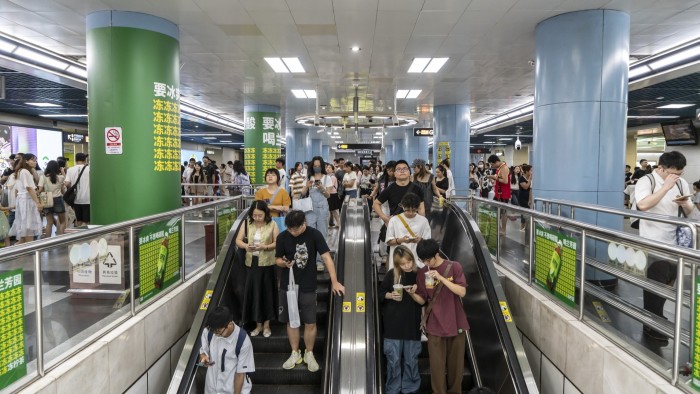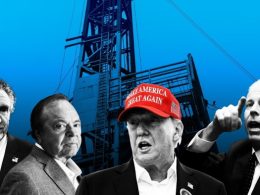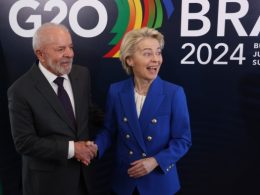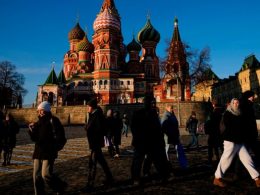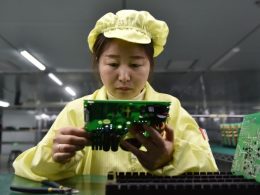China’s leaders have delivered their strongest indication yet that they are concerned about growth next year, prioritising the country’s languishing consumers over Xi Jinping’s strategic economic goals.
Emerging from their annual economic conference, Communist party leaders spoke of the need for “vigorous” efforts to boost consumption and domestic demand “in all directions”, promising to fund this by expanding the budget deficit.
Xi’s longer-term goal remains to ensure China’s “national rejuvenation” through heavy investment in high-tech areas such as chips and new energy.
But the message this week is that the need to pep up consumer spending cannot be ignored, especially as the exports that have powered the economy face the threat of more tariffs from incoming US president Donald Trump.
The focus on consumption is “a better-case scenario for how the conference could have gone in terms of the macro signals it’s sending out”, said Neil Thomas, a fellow at the Asia Society Policy Institute’s Center for China Analysis, of the two-day meeting known as the Central Economic Work Conference.
“Xi’s not giving up on his other economic and political goals, but I think he does realise that he needs to maintain a baseline of economic growth to ensure that his broader national rejuvenation agenda can keep moving forward.”
China’s economy is wrestling with low domestic demand and deep deflationary pressures following a three-year slump in the property market that has hit household wealth.
This has been accompanied by heavy state-led investment in industry and manufacturing as Xi seeks to counter efforts from the US to contain China’s high-tech industries, particularly semiconductors, through export controls.
China’s leaders have gradually changed their tone in favour of spurring consumption. In September, financial regulators announced monetary stimulus targeting stocks and real estate.
The finance ministry followed this up with a Rmb10tn ($1.4bn) debt swap for China’s heavily leveraged local governments. But to the disappointment of markets, Beijing has yet to announce any concerted fiscal stimulus.
China’s blue-chip CSI 300 index has fallen almost 12 per cent since a peak on October 8 following Beijing’s initial announcement of stimulus plans. Meanwhile, a blistering rally in its sovereign bonds continues, driving the benchmark 10-year yield down as far as 1.77 per cent, a record low.
Some had pinned their hopes on the Central Economic Work Conference for more details of a fiscal bazooka. But those details would probably only be released at China’s annual meeting of its rubber-stamp parliament in March next year, wrote Ting Lu, Nomura’s chief China economist.
The meeting’s readout did, however, list spurring consumption as the first of nine priorities for 2025, with Xi’s “new productive forces” — investing in technology and industry — coming second. This compared with science and technology being the first priority last year.
Still, the lack of detail has left markets wondering what “vigorously” promoting consumption might mean, given Communist party leaders’ distaste for western-style social welfare and fiscal stimulus measures.
A government policy adviser told the Financial Times that officials were probably looking at channelling money to households by strengthening the social safety net. China’s households have some of the world’s highest savings rates, partly because of the need to save for health emergencies and the lack of sufficient pensions, according to economists.
The adviser said measures could include expanding the coverage of health insurance schemes and their levels of reimbursement. At present, families have to pay significant amounts out of pocket for chronic health problems.
The government could also expand funding for education and the number of years of free education, the adviser said.
The readout identified these areas as priorities, saying authorities should “appropriately raise the basic pension for retirees, increase the basic pension for urban and rural residents, and raise the financial subsidy standards for urban and rural residents’ medical insurance”.
Overall, economists said they expected more subsidies for upgrading goods such as electronics and vehicles. The meeting also offered little new on housing, which many economists view as the ultimate source of the confidence crisis afflicting China’s households.
Policymakers set achieving a “reasonable rebound” of inflation as a target, noted Tao Wang, chief China economist at UBS, suggesting more interest rate cuts and monetary easing are likely. China’s producers have been facing deflationary pressures for two years as high competition and low demand depress prices.
Goldman Sachs economists forecast in a note that the country’s “augmented fiscal deficit” — their estimate of the total budget deficit including central and local governments — would widen by 1.8 percentage points to 13 per cent of GDP next year, “implying fiscal policy will do most of the heavy lifting to stabilise growth”.
Morgan Stanley economists said they expected “a marginal increase in social welfare spending” and cautioned that with trade headwinds — China is expected to face sharply higher tariffs next year from Trump — Chinese GDP growth would slow.
They said they would maintain a “below-consensus” forecast for China’s nominal GDP growth of 3 per cent year on year, “given modest easing size and headwinds from housing and tariffs”.
Additional reporting by Wenjie Ding in Beijing
Source link





